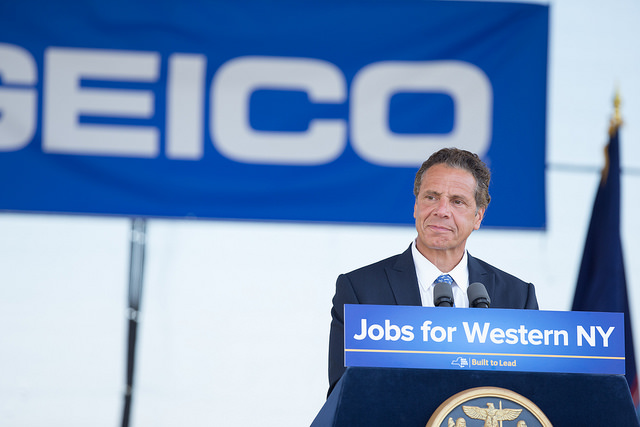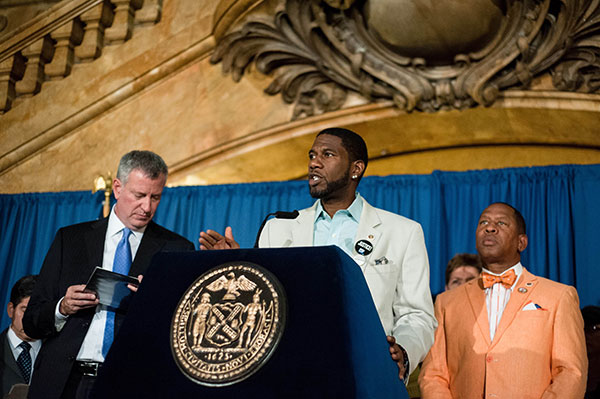Misguided Political Attack on Airbnb Can't Be Taken Lightly

photo: Brandon Muir
New York should never have reached the point where Ashton Kutcher cares more about the economic future and personal freedom of New Yorkers than the state Legislature does.
Yet, that’s exactly where we find ourselves as the actor is one of a number of tech investors who sent a letter urging Governor Cuomo to veto a bill that would crush temporary home-sharing service Airbnb.
Lawmakers in Albany and New York City began an assault on Airbnb with a 2010 bill that placed arbitrary time limits on short-term rentals.
This year they doubled down, passing an anti-innovation bill, shoved through at the eleventh hour, that goes even further. It slams users with hefty fines for advertising Airbnb-style rentals.
Not only that, but the bill’s loose language has left the door wide open for Airbnb, and its closest competitor Homeaway, to be directly hit with penalties. A violation of federal law.
Airbnb helped 400,000 visitors bring $632 million to New York City in just one year, spanning parts of 2012 and 2013.
What’s more, 25,000 New Yorkers use Airbnb to help cope with the city’s high cost of living by earning income from extra rooms. The value to hosts totaled an impressive $420-$500 million last year, according to AirDNA and American Action Forum figures.
These numbers clearly show Airbnb is a boon to New York City.
So why does Ashton Kutcher have to beg the very politicians whose constituents are benefitting from this service to not kill the industry? Because a narrow group of special interests, like the hotel industry and their workers, are entrenched in Albany and City Hall.
They are throwing everything in the kitchen sink at Airbnb, with little concern for the facts or consequences if New York loses half a billion dollars in economic activity.
That’s why New Yorkers are hearing scare tactics like false claims that “virtual hotels” are wreaking havoc on housing costs.
New York City Public Advocate Letitia James actually said that Airbnb is “precipitating a spike in homelessness, unprecedented since the Great Depression.” Really?
This hyperbole is just political hot air. Even a report from Airbnb’s arch-nemesis, the Hotel Trades Council, showed that so-called “virtual hotels” only make up 0.25 percent of the housing supply in New York City. (That’s the same group that dished out $12,000 to members of the City Council’s Housing Committee.)
You’d need a microscope to see that impact. And you’d need to be living in an alternate reality to think it’s increasing housing costs.
That’s not the only time the Airbnb opposition has ignored the facts. The Attorney General’s office found an overwhelming 94 percent of Airbnb users are not posting ads for more than two units. Another sign there is no real problem – unless you view a business innovating with a new service as a crisis.
Shielding an industry from competition should never be the goal of policymakers. That said, there may not be much reason for the hotel industry to panic.
A study on the Texas market showed “a 1 percent increase in Airbnb listings results in only a 0.05 percent decrease in hotel revenues.”
Additionally, the City saw a record 60 million visitors last year. This suggests Airbnb is combining with hotels to give travelers more options. Plus, home-sharing is actually spreading that economic activity to the outer boroughs.
Clearly, the data provides little support for outrage over Airbnb, let alone trying to undermine the business. Yet, the opposition’s risky offensive is not interested in careful consideration.
The bill they rushed through is all the evidence you need. It exposes companies to fines that would violate federal law if imposed.
In 1996, Congress saw that e-commerce was too important to be subject to the whims of state legislatures. That’s why Section 230 of the Communications Decency Act protects sites like Airbnb from being sued, or from shut down by state and local governments over users’ actions.
This statute continues to protect Internet entrepreneurs from litigation. It has allowed the creation of YouTube, Facebook, and many user-generated services we enjoy. Simply put, the legislature’s reckless fines go too far for federal law.
Still, New Yorkers deserve better than hoping the feds, or the Governor’s veto, will save them from their own misguided, and clearly compromised state legislators.
People need to learn more about this outrageous attack on innovation, and hold lawmakers accountable. We can do better than leaving it to Ashton Kutcher to protect our economic future.
***
Brandon Muir is executive director of Reclaim New York; Evan Swarztrauber is communications director for Tech Freedom. On Twitter @ReclaimNewYork and @TechFreedom.
***
Have an op-ed idea or submission for Gotham Gazette? Email This email address is being protected from spambots. You need JavaScript enabled to view it.
Reevaluating New York Economic Development Programs

Gov. Cuomo at a jobs announcement (photo: Philip Kamrass, Governor's Office)
Over the last few weeks, several reports and legislative hearings have once again cast an unflattering light on New York’s economic development policies. Unfortunately, this is nothing new. In my 14 years serving in the State Senate, I’ve seen the names of the programs change, but the results remain the same – huge giveaways to a select group of companies that don’t live up to their job creation promises.
On the Friday before the Independence Day holiday – a great time to dump bad news - the state released the job creation figures for Start-Up New York, Governor Cuomo’s much-touted program of tax-free zones primarily around colleges. You had to read the fine print to find the number of jobs created for the first two years of the program: 76 in 2014 and 408 in 2015 (although closer analysis revealed the actual number for 2015 was 395). This from a program for which the state has spent over $50 million, around $130,000 per job, just for advertising alone. The report also indicates about $1.1 million in tax breaks associated with the program in addition to these expensive ads.
At an August 3 hearing, the Assembly Committee on Economic Development grilled administration officials on these unimpressive results, and also questioned why the bulk of these government funded ads were spent in the months before the 2014 election, when the governor was seeking a second term. In his testimony, E.J. McMahon of the Empire Center for Public Policy, a conservative policy think-tank, provided some particularly useful analysis of just how much money is being devoted to these programs, and pointed out that the problems with Start-Up are just the tip of the iceberg.
According to McMahon:
“In the 2017 fiscal year, on-budget disbursements for economic development are projected to increase by $844 million—more than doubling the fiscal 2016 figure…From 2017 through 2021, the Empire State Development Corp. is expected to spend more than $6.6 billion on these and other programs, with roughly three-quarters of the money generated by backdoor borrowing…At least a half-billion more will be spent during this period on the Excelsior Jobs Program. And another $420 million a year in refundable tax credits will flow into the pockets of film and TV producers and production companies—plus $50 million a year in newly created music and video game development tax credits.”
Coming up with a complete accounting of all programs is extremely difficult, given the lack of transparency around economic development expenditures. Other states such as Illinois and Vermont require a Unified Economic Development Budget as part of their budget process, and I have long carried legislation that would create such a budgetary requirement in New York. Many legislators and testifiers at the Assembly hearing expressed frustration at the difficulty of evaluating the effectiveness of these programs given the lack of information about real cost and job creation numbers.
Recent reports from Comptroller Thomas DiNapoli on the Excelsior Jobs and Power for Jobs programs have highlighted similar issues. In his review of the Excelsior program administered by Empire State Development, the comptroller found a lack of documentation that many participants were even eligible. Furthermore, because of a reliance on self-reporting, for many companies it was impossible to verify job creation claims, or that the jobs created met requirements for work hours. Additionally, the comptroller found that job-creation goals for some companies were lowered after they failed to meet their targets.
Problems with the Power for Jobs program administered by the New York Power Authority (NYPA) were even more galling. NYPA allocates power to businesses and not-for-profits that agree to retain or create jobs in New York and to make capital investments. Among other findings, the Comptroller discovered that NYPA’s method of reporting participation in the program resulted in overstating job retention and creation by almost 30,000 jobs.
It is understandable that the governor and economic development agencies want to appear proactive in efforts to create jobs, particularly in struggling areas of the state. However, New York’s hard-working families need real jobs, not just accounting tricks. Economic development programs need to be based on facts, not wishful thinking, and must be completely transparent about their costs and results.
The evidence continues to pour in that New York’s current policies may benefit specific recipients, but they do not amount to a coherent or cost-effective strategy for job creation in our state.
***
Liz Krueger is a New York State Senator representing the East Side of Manhattan, and the ranking Democratic member of the Senate Finance Committee. On Twitter @LizKrueger.
***
Have an op-ed idea or submission for Gotham Gazette? Email This email address is being protected from spambots. You need JavaScript enabled to view it.
Note: this column has been updated to accurately reflect the tax breaks associated with Start-Up NY, about $1.1 million, included in the report referenced.
Working with The Next Police Commissioner

City Council Member Jumaane Williams, the author (photo: Jeff Reed)
Given where we are in the policing discussion in this city and country, and the acknowledgement of how deeply systemic the problems lie, focusing on the departure or hiring of any one Commissioner has always simplified a complex problem. I have never known a time when people were not calling for the removal of an NYPD Commissioner as the solution to policing issues in our city.
It was right for many of us to express concerns when Commissioner Bill Bratton was chosen, given troublesome incidents in Boston, Los Angeles, and right here in New York City. It was also our duty to point out clearly and boldly when we thought he was not helping us steer the conversation in the right direction. Indeed, there were times when Commissioner Bratton showed contempt for the City Council's role in government. The Police Department is not an agency unto itself, free of the city’s legislative body. The Commissioner has also, at times, used language that ranged from insensitive to incendiary and dangerous.
Still, we would be wrong to say that no change has occurred during his tenure.
We can argue about what the changes that have occurred mean, how effective they are and will eventually be, but we cannot ignore them. While there are still issues with the percentage breakdown by race of who is getting stopped and arrested, there have been significant drops in stop-question-and-frisks and marijuana arrests. The Neighborhood Coordination Officers Program, while not true community policing, is a good attempt to move away from focusing on arrests and summonses. There have been legislative victories, collaborations, and of course, the retraining of the entire force -- all while pushing crime to historic lows.
It takes many partners to deal with public safety and NYPD has a crucial role.
With all that said, we are not where many of us thought we would be in 2016, particularly in the areas of trust and accountability. In these areas improvement has been slow, even stagnant. This is where the new Commissioner, James O'Neill, whom I've grown to view as an honest broker, can really focus on moving the ball forward. I congratulate him on his appointment and look forward to working with him.
Long-lasting change cannot happen until we tackle all of the socioeconomic and structural obstacles that poor, black, and brown communities face. Unemployment, inadequate housing, and an unsatisfactory education system are all problems that need interagency solutions. Police have a tough job, and we owe it to them and the community not to ask them to do jobs that they shouldn't be doing.
In addition, the City Council has a legislative responsibility to do its part. To that end I am disappointed to hear Chief O’Neill say he will support the current agreement around the Right to Know Act (RTKA) without creating law. The RTKA goes hand-in-hand with the new neighborhood policing model, as well as the Right to Record Act, which helps protect both police and community. Together, they are responsible, common sense laws that will promote transparency and accountability in the police department, with the RTKA proposals mirroring recommendations from the President's Task Force on 21st Century Policing. These pieces of legislation will also help repair the relationship between the department and black and brown communities.
While improved policing practices and common sense legislation are steps in the right direction, we cannot expect the troubles of the community to be fixed solely by police and lawmakers. If we are honest, the biggest improvement would be the complete acceptance that the responsibility for public safety cannot be left to police alone. This acknowledgement must be combined with concentrated funding for other resources that complement, match, or exceed investment in law enforcement.
I look forward to working with the new Commissioner on these ideas and others.
When asked about the future of policing in this city when Commissioner Bratton was appointed I said then that I was “cautiously optimistic.” As an elected leader, I make no apologies for remaining optimistic in the worst and best of times while fighting to do right. If asked again as Commissioner O’Neill is set to take over, my answer would be the same.
***
Jumaane D. Williams is a City Council member from Brooklyn and co-chair of the Council's Task Force to Combat Gun Violence. On Twitter @JumaaneWilliams.
***
Have an op-ed idea or submission for Gotham Gazette? Email This email address is being protected from spambots. You need JavaScript enabled to view it.




